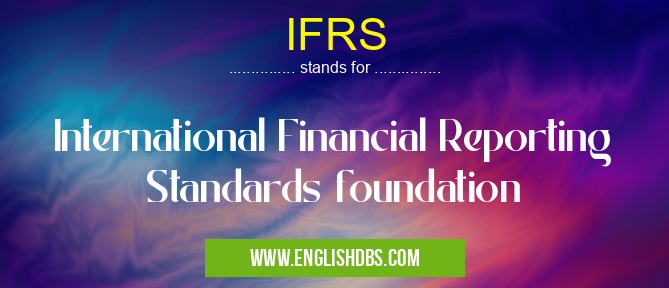What does IFRS mean in ACCOUNTING
IFRS stands for International Financial Reporting Standards, which are a set of accounting standards developed by the International Accounting Standards Board (IASB). IFRS aims to provide a common framework for the preparation of financial statements that are transparent, comparable, and reliable, enabling investors, creditors, and other users to make informed decisions.

IFRS meaning in Accounting in Business
IFRS mostly used in an acronym Accounting in Category Business that means International Financial Reporting Standards foundation
Shorthand: IFRS,
Full Form: International Financial Reporting Standards foundation
For more information of "International Financial Reporting Standards foundation", see the section below.
» Business » Accounting
Key Characteristics of IFRS
- Global Acceptance: IFRS are accepted in over 140 countries around the world, including the European Union, the United States, and many other major economies.
- Common Framework: IFRS provides a consistent set of rules that companies can use to prepare their financial statements, regardless of their location or industry. This helps to enhance comparability and transparency across companies.
- High Quality: IFRS are developed through a rigorous process involving extensive research, public consultation, and expert input. They aim to provide high-quality accounting standards that are based on sound financial reporting principles.
- Flexibility: IFRS provides principles-based standards that allow companies to apply the rules in a way that is appropriate for their specific circumstances. This flexibility helps to ensure that IFRS can be applied to a wide range of businesses.
Benefits of Using IFRS
- Improved Comparability: IFRS enables investors and other users to compare financial statements across different companies and industries, even if they are located in different countries. This helps to facilitate investment decisions and risk assessment.
- Enhanced Transparency: IFRS promotes transparency in financial reporting by requiring companies to disclose relevant information in a consistent manner. This improves the reliability and credibility of financial statements.
- Reduced Costs: By using IFRS, companies can reduce the costs associated with preparing financial statements. This is because they do not need to adapt their accounting practices to multiple sets of standards.
- Increased Access to Capital: IFRS can enhance a company's access to capital by demonstrating that its financial statements meet international standards of quality.
Essential Questions and Answers on International Financial Reporting Standards foundation in "BUSINESS»ACCOUNTING"
What is the International Financial Reporting Standards (IFRS) Foundation?
The IFRS Foundation is an independent, private-sector body that develops and approves International Financial Reporting Standards (IFRSs). IFRSs are a set of accounting standards that are used by companies in over 140 countries around the world.
What is the purpose of the IFRS Foundation?
The purpose of the IFRS Foundation is to develop and approve IFRSs that are high-quality, understandable, enforceable, and relevant to the needs of users of financial information.
Who are the members of the IFRS Foundation?
The members of the IFRS Foundation include representatives from a wide range of stakeholders, including investors, companies, auditors, and regulators.
How are IFRSs developed?
IFRSs are developed through a process that involves extensive consultation with stakeholders. The IFRS Foundation's staff develops draft IFRSs, which are then reviewed by the IFRS Foundation's trustees. The trustees approve IFRSs that they believe meet the IFRS Foundation's objectives.
What are the benefits of using IFRSs?
There are a number of benefits to using IFRSs, including:
- Increased comparability: IFRSs help to make financial statements from different companies more comparable, which can make it easier for investors and other users of financial information to make informed decisions.
- Reduced costs: IFRSs can help to reduce the costs of preparing financial statements, as companies can use the same standards regardless of where they operate.
- Improved access to capital: IFRSs can help companies to improve their access to capital, as investors are more likely to invest in companies that use a globally recognized set of accounting standards.
Final Words: IFRS plays a critical role in the global financial reporting landscape. By providing a common framework for the preparation of financial statements, IFRS enhances comparability, transparency, and reliability. It benefits investors, creditors, and other users by enabling them to make informed decisions, and it also reduces costs for companies and facilitates access to capital. As a result, IFRS has become a widely accepted standard for financial reporting worldwide.
